As I said, it depends whether "we" regard the practices of other European countries to be adequately 'safe' in the mind of the UK.Given what has been said about suitability for foreign markets and 16A OPDs, I'm struggling to follow that logic to a point where any fuse other than 13A is required.
I would imagine that if you looked at some "very foreign markets", you would find some electrical practices which would definitely not be regarded as acceptable in the UK!
Same here. As I often say, that is 'how I woz brought up', coupled with 'why not?'. As I also often say, for this reason I must be one of the best customers of suppliers of 1A BS1362 fusesIn the meantime, I'll continue to choose fuses based on the power of the connected appliance.
Kind Regards, John


